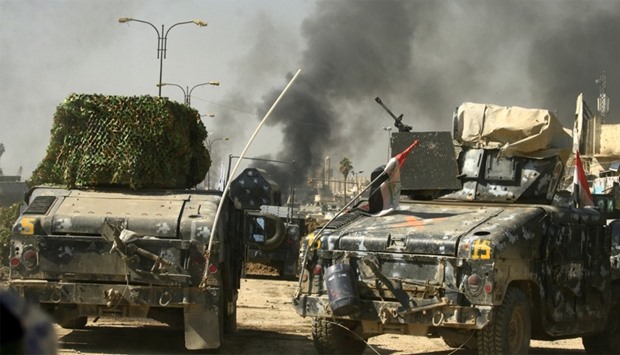Supported by the US-led anti-IS coalition, Iraqi government forces and a Kurdish-Arab alliance in Syria are battling to push the jihadists from Mosul and Raqa, the last two major urban centres under their control.
Intense fighting in recent days has forced tens of thousands of people from their homes, raising fears for many more civilians still trapped in areas of IS's so-called ‘caliphate’.
In Iraq, security forces advanced towards a compound of jihadist-held government buildings and a bridgehead, on the second day of a renewed push in west Mosul.
The operation to retake west Mosul began on February 19, but had slowed amid several days of bad weather until a fresh drive began on Sunday.
A senior Iraqi commander said that interior ministry forces, backed by artillery and air support, were advancing in three west Mosul neighbourhoods with the aim of taking the compound.
AFP reporters in west Mosul witnessed intense clashes, with heavy automatic weapons fire and clouds of black smoke billowing over the city.
Lieutenant Colonel Abdulamir Mohammedawi of the interior ministry's elite Rapid Response Division told AFP its forces were ‘advancing in the Al-Dawasa and Al-Danadan areas to liberate the government buildings and secure a route for families to leave’.
- Bridge in sights -
Its sights were also set on the nearby Al-Hurriyah Bridge, he said, but Rapid Response had ‘not yet’ reached it.
Mosul is divided by the Tigris River, and while the series of bridges crossing it have either been damaged or destroyed, they would provide a link between the Iraqi government-held east and IS-held west Mosul if they can be repaired or otherwise bridged.
Iraqi forces recaptured the western side of the fourth bridge, which is south of Al-Hurriyah, at the end of February.
Iraq's Joint Operations Command also announced Monday that the elite Counter-Terrorism Service (CTS) had recaptured Al-Sumood, an area it had targeted as part of the push launched the day before.
The fighting in west Mosul has sparked an exodus from that side of the city, pushing more than 50,000 people to flee, the International Organization for Migration said.
The operation to retake Mosul was launched on October 17, with a number of forces taking part but CTS and Rapid Response ultimately playing the leading roles in the advance.
In Syria, US-backed forces on Monday cut off a key supply route between IS stronghold Raqa and the group's territory in Deir Ezzor province.
The Syrian Democratic Forces (SDF), an alliance of Kurdish and Arab fighters, seized control of the only major road linking Raqa along the Euphrates valley to Deir Ezzor, the Syrian Observatory for Human Rights monitoring group said.
‘The route... linking Raqa to Deir Ezzor was cut this morning,’ an SDF commander confirmed.
- IS imposes dress code -
Activists and the Observatory said, meanwhile, that IS has imposed an ‘Afghan-style’ dress code in Raqa to help its fighters blend into the civilian population.
Abu Mohamed, an activist with the ‘Raqa is Being Slaughtered Silently’ group, said the aim was to ‘make it harder for airplanes and the Kurdish forces... to distinguish between civilians and Daesh (IS)’.
‘Anyone who does not comply faces prison and a fine,’ he told AFP.
The SDF began its offensive against Raqa in early November and has since seized swathes of territory in northern Syria from the jihadists.
Last month its forces made a major incursion into Deir Ezzor, an oil-rich province almost completely held by IS, to encircle and besiege the jihadists in Raqa which is located further west.
The SDF alliance, dominated by the Kurdish People's Protection Units (YPG), has benefited from air support, equipment and training provided by the US-led coalition that has been carrying out air strikes against IS in Syria and Iraq.
IS is under pressure on multiple fronts, not only Mosul and Raqa, but in other parts of northern Syria where it is facing offensives from government forces and Turkish-backed rebels.
Around 66,000 people have fled the fighting in north Syria in recent days, UN humanitarian agency OCHA said.
IS, which emerged from the chaos of Syria's civil war to seize large parts of the country and neighbouring Iraq in 2014, has lost much of the territory it once claimed.

